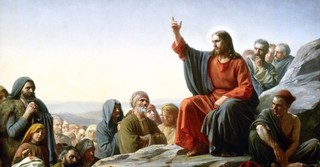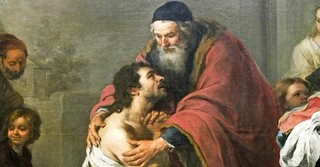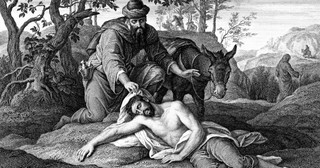Mary and Martha - Bible Story
Share

Mary and Martha in the Bible
The Bible Story of Mary and Martha comes from Chapter 10 of the Gospel of Luke. Mary and Martha, who are sisters, open their home to Jesus as he travels with his disciples. As Martha hurries to ensure the preparations, Mary simply sits at the feet of Jesus and listens to the wisdom of Christ. Mary and Martha are two sisters with incredibly different focuses. While Mary soaks in the moments with Jesus, Martha can't think past the cooking and cleaning. Martha quickly becomes frustrated with all the work she is doing alone and complains to Jesus! Martha then says to Jesus, "Lord, don't you care that my sister has left me to do the work by myself? Tell her to help me!" Jesus replies, "Martha, Martha, you are worried and upset about many things, but only one thing is needed. Mary has chosen what is better, and it will not be taken away from her."
Moral and Meaning of Mary and Martha
If Jesus was in front of you, would your first thought be to make everything perfect or to stop and spend time with the Savior? What is your mind's attention on? What we give our mind's attention to, gets our heart's affection. Mary prized the time with Jesus and gave her entire focus to his presence. When Martha complains to Jesus, he gently reminds her of what her focus should be on - building a relationship with Him. Yes, Martha showed wonderful hospitality welcoming Jesus and his disciples in, but she got lost in the distractions.
What is stealing your attention from Jesus today and letting bitterness sneak in? It's time to stop rushing and worrying like Martha and take a seat like Mary. We can set aside time each day to come before the Lord in prayer and reading His word. He offers us peace in the middle of chaos and worries. His grace is sufficient and His mercies are new every morning!
"But seek first the kingdom of God and his righteousness, and all these things will be added to you." ~ Matthew 6:33
"For by grace you have been saved through faith. And this is not your own doing; it is the gift of God, not a result of works, so that no one may boast. For we are his workmanship, created in Christ Jesus for good works, which God prepared beforehand, that we should walk in them." ~ Ephesians 2:8-10
Why Is the Story of Mary and Martha so Relevant Today?
With the exception of Jesus’ mother Mary, Lazarus’ sisters Mary and Martha are probably the most famous female characters in the Bible. They are witnesses to one of Jesus’ most spectacular miracles, and Mary shows her devotion to Jesus in a powerful way. For many of us, their big contribution to the Gospels is the story of what happened when Jesus visited them. Jesus used this moment to make a point about priorities which still applies to us today.
What Happens in the Story of Mary and Martha?
Mary and Martha appear multiple times in the Gospels. Their brother Lazarus gets risen from the dead, and according to the Gospel of John, it was Mary who anointed Jesus with expensive perfume.
However, the most famous story of Mary and Martha comes in Luke 10, when Jesus and his disciples are traveling to Jerusalem and come to the sisters’ home. While a meal is being prepared, Jesus starts teaching and Mary sits at his feet, listening (Luke 10:39). Martha is apparently also listening but distracted by the meal preparation and gets irritated that Mary isn’t pitching in. Martha goes to Jesus and says, “Lord, doesn’t it seem unfair to you that my sister just sits here while I do all the work? Tell her to come and help me” (Luke 10:40).
Jesus’ response was unexpected. Rather than tell Mary to help, Jesus says, “Martha, Martha, you are worried and upset about many things, but few things are needed—or indeed only one. Mary has chosen what is better, and it will not be taken away from her” (Luke 10:41-42).
What Was Martha's Role in the Bible?
While it’s easy for modern Western readers to see Martha as a “wet blanket,” we need to recognize that Martha was doing what was expected of her. Ancient Roman or ancient Jewish societies generally didn’t treat women well. Educational opportunities were limited, with few women receiving any kind of religious training or apprenticeship in any trade. Very few women had professional jobs – Lydia the purple cloth seller in Acts 16 is a notable exception, and she lived in a wealthy Greek city, the kind of place that works by being cosmopolitan.
As a rule, women in Martha’s world were expected to rely on their families or husbands to get by—which is why writers like E. Randolph Richards and Tim Harlow have noted the Samaritan woman at the well with five past husbands was not necessarily a harlot. In a world where disease killed many before their time, and men could easily divorce women for not producing children, the Samaritan woman may have just gone from one relationship to another because that was how she survived. Women were valued for being good wives, keeping the house, and having children. In that light, it’s not surprising that Martha’s first instinct at Jesus’ visit was to make sure the dinner was taken care of. Being the good hostess, the good cook, the person behind the scenes who keeps everything going—these were what most people valued Martha for.
There are also indications in the story of Lazarus’ resurrection that Martha was the more pragmatic of the two sisters. When Jesus arrives several days after Lazarus had died, Mary and Martha both tell Jesus that if he’d been there, Lazarus would not have died. When Jesus tells Martha that Lazarus will rise again, Martha replies, “I know that he will rise in the resurrection on the last day” (John 11:25). Jesus follows up by asking if Martha believes he is the resurrection and the life, and she says she does believe. The fact that Martha initially seems to misunderstand Jesus, thinking he’s telling her to take the long view of the situation, may suggest she was a pragmatist. Pragmatism is not a bad trait, but sometimes it can keep us from focusing on what’s really important.
Pragmatism also seems to be part of Martha’s attitude at Jesus’ visit. The text says that she was “distracted” by making the dinner (the Message Bible’s paraphrase puts it, “Martha was pulled away”). This wording seems to suggest that Mary and Martha were both invited to sit at Jesus’ feet and learn from him, or at least that offer was open for both of them. Martha apparently took the pragmatic route to get the meal on the table and missed the fact that at that moment, practical matters could pause for something more important.
What Was Mary's Role in the Bible?
Like Martha, we don’t learn too much about Mary’s personality from the Gospels’ accounts. What we do notice is that she clearly wanted to know God and wasn’t afraid to show it when Jesus came.
As noted earlier, Mary and Martha lived in a society that didn’t value teaching women or giving them much agency. Education for women would have often happened within the family—brothers teaching sisters things they’d learned from school, fathers passing on bits of religious teaching here and there. Therefore, the idea of a woman sitting at a rabbi’s feet to hear his teaching would have seemed bizarre, possibly blasphemous. The fact that Mary dared to do that shows she hungered for godly teaching and wasn’t afraid to hide it. The acceptable thing in her society would have been to serve guests and get the gist of Jesus’ teaching from someone else later, perhaps asking Lazarus the next morning to sum up what Jesus said. Instead, Mary sat at Jesus’ feet to hear the truth directly from him.
Mary’s anointing Jesus is another example of forthright behavior by someone who doesn’t care what others think. The perfume is described as expensive and anointing someone’s body is a deeply personal thing. Mary cared more about showing her devotion to God, even when it looked excessive and scandalous than she did about public opinion.
Why Does Jesus Rebuke Martha in the Story?
One of the first things we need to recognize about this story is that Mary and Martha are not simply “the hero” and “the villain.” Martha’s actions in and of themselves were about being hospitable and serving her guests—two things which when used rightly are good and God-honoring. 1 Peter 4:9–10 describes hospitality as a spiritual gift, and Romans 12:6-8 describes service as a spiritual gift. So the problem with Martha’s actions wasn’t that she was doing things that God doesn’t value. The problem has to be something else, which we must tease from the context of the situation.
As pointed out earlier, the text says that Martha was distracted from listening to Jesus, which may suggest she’d been invited to sit at his feet but kept going off to focus on the meal instead. This would fit Jesus’ point about Martha being upset by many things, not realizing which thing is the right one to focus on.
The idea that this is about priorities comes again when we notice that Martha asks Jesus whether it’s “unfair” that Mary isn’t doing any work. Fairness is about priorities, finding the right option at the moment. Martha is asking what is more important in that context: listening to Jesus or making sure he is well cared for as a guest. Jesus responds that the most important thing is to learn from him, the resurrection, and the light. There is a time and a place for everything (Ecclesiastes 3:1-8). At that moment, the most important thing was to listen and learn.
Discover the full scripture text of the Mary and Martha Bible Story along with related articles below!
Photo credit: ©GettyImages/DGLimages
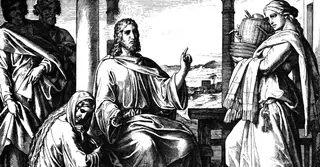




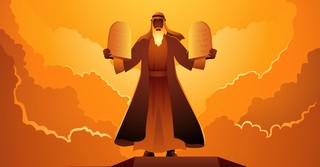
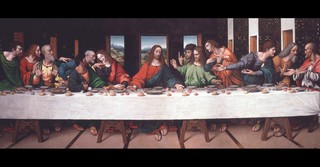

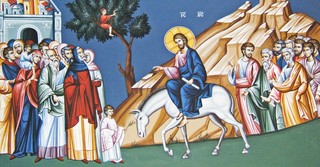

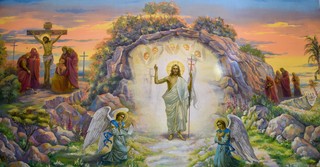
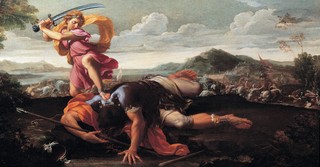
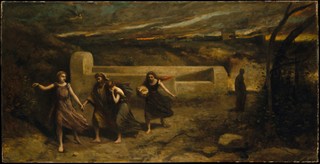
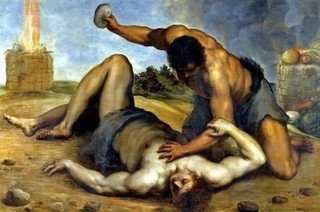
.800w.tn.jpg)
